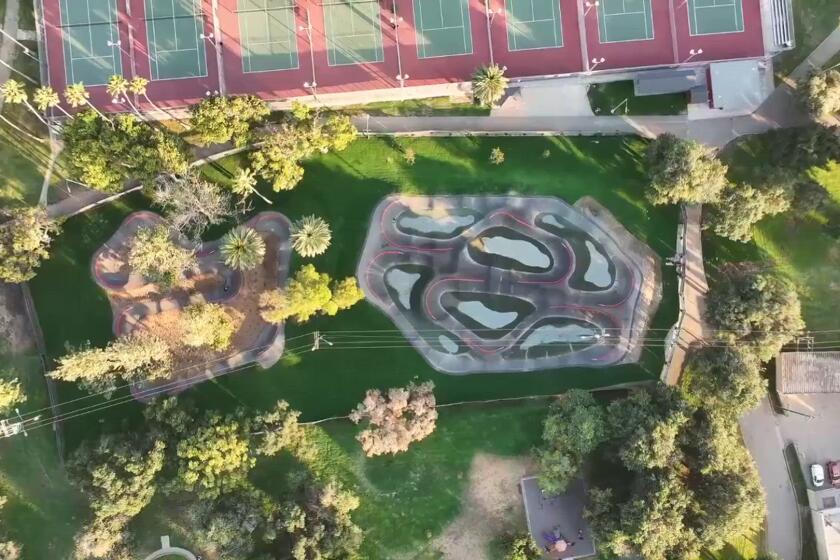Music : For Cherubini, Beethoven’s Divine
There’s more to the Cherubini String Quartet’s name than meets the eye. For starters, of course, there’s composer Luigi Carlo Zanobi Salvadore Maria Cherubini, who bestrode the 18th Century like a colossus.
Today, the ensemble’s namesake is almost entirely forgotten. “But Cherubini composed interesting string quartets,” first violinist Christoph Poppen said in a recent phone interview from Bethesda, Md., where the quartet was starting its third U.S. tour. “We also are very much in love with Italy and Florence, where he came from,” Poppen said.
There’s more. Said Poppen: “Cherubini is the plural of Cherubino,” the irrepressible, trouble-finding adolescent page in Mozart’s “Le Nozze di Figaro.” So the quartet consists of “four Cherubini,” he said.
If that’s not enough, there’s also “this association with (the orders of) angels--the cherubim and the seraphim.”
“We don’t feel like angels,” Poppen said, “but we do feel that music is divine.”
The German group will play a Beethoven program on Saturday in Founders Hall at the Orange County Performing Arts Center in Costa Mesa. It will offer a different program at the William Andrews Clark Memorial Library in Los Angeles on Sunday.
Poppen, 38, said he began playing in string quartets when he was 14 “and never stopped.” He founded the Cherubini in 1978. Fellow members include violinist Ulf Wallin, violist Hariolf Schlichtig and cellist Christoph Richter.
*
Wallin and Richter are new, replacing violinist Harold Schoneweg and cellist Manuel Fischer-Dieskau, son of famed baritone Dietrich Fischer-Dieskau. Both left last year “for family reasons,” Poppen said. “They didn’t want to travel so much. We were very lucky to find some new members.”
Traveling takes the group outside Germany for about half of the 70 concerts they play a year. Meanwhile, they all maintain independent instrumental careers (Poppen becomes artistic director of the Munich Chamber Orchestra later this year) and teach in different schools. Poppen is based in Berlin; Wallin in Detmold; Schlichtig in Munich, and Richter in Essen.
*
“We need very good coordination to rehearse,” Poppen said. “We’ll rehearse periodically for a week or 10 days at a time and then only rehearse, rehearse around the clock.” While they sometimes rotate the meeting ground among each others’ homes, the usual location is an “apartment in the Austrian mountains.”
When the quartet made its Los Angeles debut in 1993 as part of its second U.S. tour, a Times reviewer wrote that the group “does not accept the stereotype of chamber music as fragile stuff for finicky aesthetes.” The playing, he wrote, “was a marvel of big, heaving sounds and fierce passions.”
That pleased Poppen. “We are always working on forming a very close group, but we do believe in having our individuality evidenced strongly. Nobody has to step back,” he said. “The frame of the quartet as a whole should be big enough to include everybody. That’s our idea. I wouldn’t call it aggressive, but we try to play honestly in a certain way--to look at music not only in terms of beautiful entertainment, but really as a question of life or death.
“And we try to look for programs that include this very approach to music.
“With Schubert’s ‘Death and the Maiden’ quartet, this is literally a question of life and death. And especially in late Beethoven, there is no human affection that is not included in the music. We look for everything--for the very soft and sweet places as well as the very aggressive and cruel places and everything that is in between.”
The Quartet will play a Beethoven program in Founders Hall, including Opus 18, No. 4 in C minor; Opus 135 in F, and Opus 59, No. 2 in E minor. Each represents one of the three “periods” in the composer’s life, but they will be played in the order listed, not chronologically.
“We have been performing all the Beethoven quartets in a series at various places and have done them all in chronological order, which is rather rare, actually, because we like the chronology,” Poppen said.
“But in this particular program, we’re doing it this way because although Opus 135 is much shorter than Opus 59, the late quartet is even more difficult for the audience to follow. And usually the piece before the interval gets the most serious attention.”
They’re starting with the early C minor quartet “because C minor always has been a very important key for Beethoven. There is the ‘Fate’ motif in the Fifth Symphony. That sort of very mysterious atmosphere is already present in this early quartet but combined with a very light scherzando character in the second movement.
“The connection with Opus 135, is that there is no deeper place than the slow movement and there is no quartet that is lighter and more happy than in the last movement.”
Opus 59, No. 2, he said, has “this beautiful long movement. Beethoven wrote at the start of it, ‘Please treat this movement with a lot of sentiment.’ You’d think he’d write that about every movement, but he put that direction here.”
* The Cherubini String Quartet will play works by Beethoven on Saturday at 8 p.m. in Founders Hall at the Orange County Performing Arts Center, 600 Town Center Drive, Costa Mesa. $20. (714) 556-2787. The Quartet will play a different program, including music by Beethoven, Schubert and Alfred Schnittke on Sunday at 2 p.m. at the William Andrews Clark Memorial Library, 2520 Cimarron St., Los Angeles. $10. (213) 731-8529.
Sign up for The Wild
We’ll help you find the best places to hike, bike and run, as well as the perfect silent spots for meditation and yoga.
You may occasionally receive promotional content from the Los Angeles Times.



